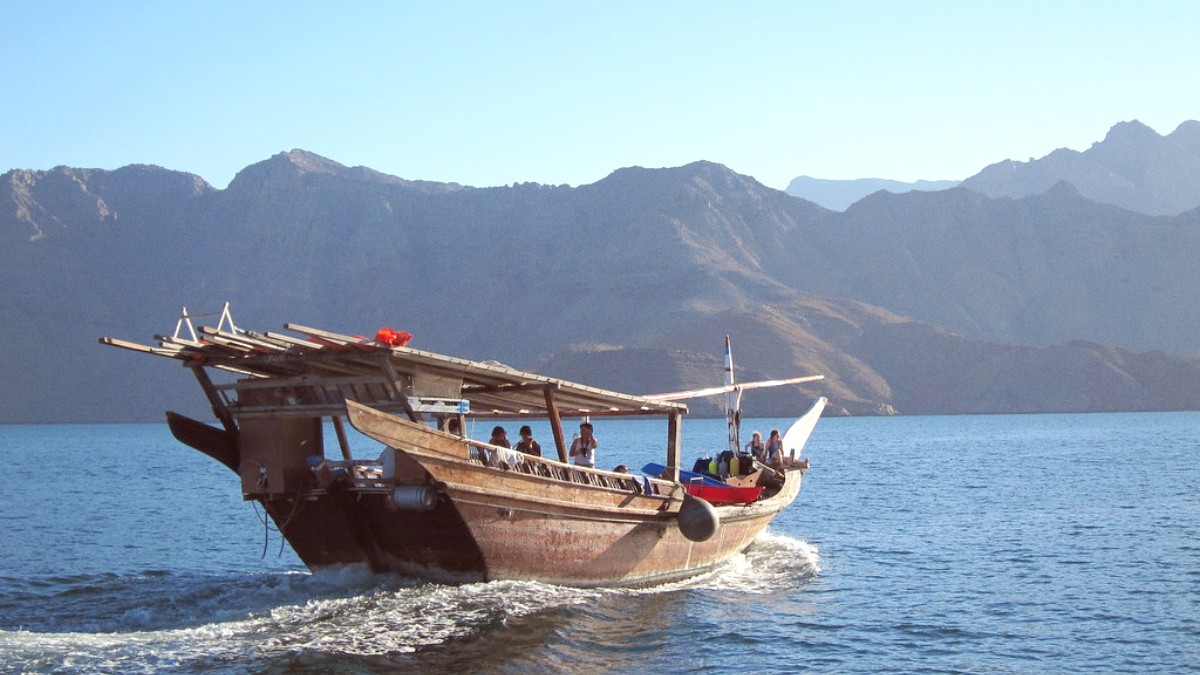
Oman
Musandam's weather patterns divide clearly into two main seasons: a long, hot summer and a shorter, mild winter.
Summer (May - September) brings extremely hot and humid conditions. Daytime temperatures frequently exceed 40°C (104°F). Winter (October - April) is the most pleasant and therefore the most popular time to visit. Daily temperatures range from a comfortable 20°C to 30°C (68°F to 86°F).
When planning your trip, consider what activities matter most to you.
If marine adventures take priority, the high season is your best bet for pleasant weather. If a quiet, budget-friendly trip takes priority, the shoulder season can offer a good balance.
May - September
Lowest prices, uncrowded environment.
Extreme heat, limited outdoor activities.
October, April
Pleasant temperatures, fewer crowds, better deals.
October can still be hot, April warms quickly.
November - March
Perfect weather for all outdoor activities.
Higher prices, more crowded attractions.
Oman modernized its visa system; the eVisa is standard for most tourists. GCC residents may enter with fewer restrictions. Citizens of several countries, including the United States, United Kingdom, Canada, Australia, and most European Union member states, may enter for tourism without a prior visa for stays up to 14 days. This visa-free entry typically requires a confirmed hotel reservation, travel insurance, and a return or onward ticket. For longer stays or prior approval, an eVisa is used. While visa on arrival was available historically, the eVisa system largely replaced it.
Your passport must retain validity for at least six months beyond your planned departure. If you obtained an eVisa, carry a printed copy. Passport-sized photos are not always needed for eVisa once approved, but can be carried. Immigration officials may ask for proof of onward travel and confirmed accommodation. Comprehensive health or travel insurance covering your stay is a stated requirement, even for visa-exempt travelers. Proof of sufficient funds may be requested.
The Royal Oman Police eVisa portal (Evisa.rop.gov.om) is the only official source for visa information. Check before travel.
Fees vary by nationality and stay duration. A 30-day single-entry tourist eVisa costs OMR 20 (approx. USD 52). Fees are paid online.
Upon arrival, present passport and eVisa. Officers review documents, stamp passports, and may collect biometric data. The process is straightforward.
Most tourist activities require no special permits beyond your visa. For remote wadis or serious mountain expeditions, consult a local tour operator or Royal Oman Police.
No mandatory vaccinations, unless from a Yellow Fever risk country. Comprehensive health insurance is strongly recommended, and often a stated requirement for visa-free entry.
While Oman is generally more expensive than some neighboring countries, Musandam offers options for various budgets.
The official currency is the Omani Rial (OMR), one of the world's strongest currencies. 1 OMR is approximately 2.60 USD.
Tipping is not mandatory in Oman, but it receives appreciation for good service, especially in tourist-oriented establishments. Omani culture values hospitality, and gestures of appreciation for service are well-received.
Daily cost estimates per person, excluding international flights.
Musandam, and Oman generally, is a reputation as one of the safest travel destinations.
Budget Traveler: OMR 30-50 (USD 78-130) per day.
This budget involves basic guesthouses, local eateries, shared transport, and self-guided activities. Careful planning and prioritizing local experiences mark this style.
OMR 70-120 (USD 182-312) per day. This budget allows for a comfortable trip with a good balance of experiences and conveniences.
Comfortable hotels, varied dining.
Not for premium, tailor-made experiences.
OMR 150+ (USD 390+) per day. This budget provides for a premium, tailor-made experience with maximum comfort and exclusivity.
High-end resorts, private charters.
Highest costs for all services.
Prices vary significantly depending on vehicle type and whether tours are shared or private.
Taxi (short ride): OMR 2-5. Car Rental (per day): OMR 15-30.
Private Dhow Charter (half-day): OMR 80-150+. Jebel Harim 4x4 Tour: OMR 25-40 per person.
| Category | OMR Range | USD Range |
|---|---|---|
| Budget Guesthouse | 15 - 30 | 39 - 78 |
| Mid-Range Hotel | 30 - 70 | 78 - 182 |
| Luxury Resort | 70 - 200+ | 182 - 520+ |
While Musandam is generally healthy, a few concerns are worth noting.
Most important concern, especially in summer. Drink plenty of Bottled water. Avoid excessive caffeine/alcohol. Wear light clothing. Seek shade. Limit strenuous activity.
UV index often high. Use High SPF sunscreen. Reapply frequently. Wear a Wide-brimmed hat, Sunglasses, and protective clothing for sun protection.
Mosquitoes are present. Use Insect repellent at dusk and dawn. If camping, check for Mosquito nets.
Food & Waterborne Illnesses: Be cautious.
Stick to Bottled water for drinking. Avoid ice made from tap water if unsure of its source.
Be discerning with street food or smaller, less hygienic establishments. Wash your hands frequently with soap and water, or use an Alcohol-based hand sanitizer, especially before eating.
Tap water in Khasab is generally treated, but bottled water is often preferred by tourists.
Khasab has a public hospital (Khasab Hospital) for basic medical services and emergencies. Complex medical issues may involve transfer to Muscat or UAE.
Several pharmacies in Khasab stock common over-the-counter and prescription drugs. Bring adequate supply of your specific prescription medications.
For any emergency (police, ambulance, fire), dial 9999 from any local phone. Operators generally speak English.
Musandam faces limited natural disaster risks, but some seasonal hazards require awareness.
Before your trip, save important contact numbers.
Dial 9999 (Police, Ambulance, Fire) from any local phone in Oman.
The Royal Oman Police are helpful for tourists needing assistance.
Keep contact details of your country's embassy or consulate in Muscat. Register your trip if your country offers such a service.